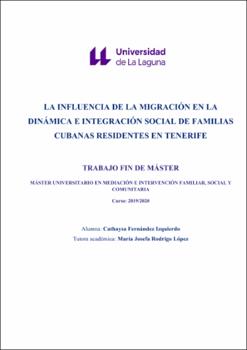La influencia de la migración en la dinámica e integración social de familias cubanas residentes en Tenerife
Fecha
2021Resumen
El objetivo principal de este estudio es la exploración del discurso de las figuras
parentales de familias migrantes cubanas, residentes en la provincia de Santa Cruz de
Tenerife, sobre la familia y la sociedad canaria y su influencia sobre la propia dinámica
familiar y la integración social en los contextos de vida en los que se desenvuelven. Para
ello, se ha empleado una metodología de orientación cualitativa mediante la técnica de
entrevista grupal realizada a dos madres y un padre con al menos un hijo/a. Tras la
transcripción de la entrevista grupal se ha llevado a cabo un análisis cualitativo
resultando un total de 147 citas verbales, mediante el software de análisis de datos
ATLAS ti. Los análisis de las citas arrojan 15 códigos relevantes relacionados con el
tema de estudio, apuntando, en líneas generales, a una satisfacción con la sociedad
canaria por parte de las figuras parentales, aunque predomina la percepción de
segregación en el proceso de integración cultural de estos. Del mismo modo, se observa
predominio del estilo educativo autoritario respecto a la crianza de los hijos/as. Por
último, la falta de apoyos informales es un factor de riesgo que fomenta, aún más, la
precariedad laboral que su situación irregular les origina. The main objective of this study is to explore the discourse of the parental figures of
Cuban migrant families, residents in the province of Santa Cruz de Tenerife, about the
family and Canarian society and their influence on family dynamics and social
integration in the life contexts in which they operate. For this, a qualitative orientation
methodology was used through the group interview technique carried out with two
mothers and a father with at least one child. After the transcription of the group
interview, a qualitative analysis was carried out, resulting in a total of 147 verbal
citations, using the ATLAS ti data analysis software. The analyzes of the citations show
15 relevant codes related to the subject of study, pointing, in general terms, to a
satisfaction with the Canarian society by the parental figures, although the perception of
segregation in the process of cultural integration of these prevails. Similarly, a predominance of the authoritarian educational style is observed with respect to the
raising of children. Finally, the lack of informal supports is a risk factor that further
encourages job insecurity caused by their irregular situation.





